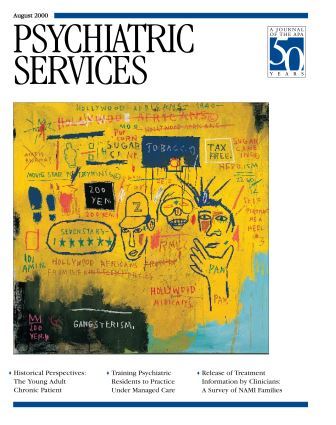Letters from readers are welcomed. They will be published at the discretion of the editor as space permits and will be subject to editing. They should be a maximum of 500 words with no more than three authors and five references and should include the writer's telephone and fax numbers and e-mail address. Letters related to material published in
Psychiatric Services will be sent to the author for possible reply. Address letters to John A. Talbott, M.D., Editor,
Psychiatric Services, American Psychiatric Association, 1400 K Street, N.W., Washington, D.C. 20005; fax, 202-682-6189; e-mail,
[email protected].
To the Editor: In the Managed Care column in the April 2000 issue, Drs. Sabin and Daniels (
1) state that the Iowa managed care initiative is widely regarded as a successful behavioral health carve-out program. They base their assessment on interviews with multiple stakeholders, who described a climate of collaboration and creativity in addressing the challenge of serious mental illness. Much of the background information that was used in their column cited a report that I prepared at the request of the National Alliance for the Mentally Ill (NAMI) (
2). However, the conclusions that I drew from the information contained in that report were different from those presented by Sabin and Daniels.
In a commentary summarizing my conclusions from the NAMI report (
3), I pointed out that many of the problems that occurred in Iowa might have been minimized or avoided if appropriate mechanisms for oversight and for enforcement of standards for care had been included in the original contract specifications. In general, I believe that Sabin and Daniels accurately present the positive evolution of the Iowa managed care program that has occurred since its inception. However, the column gives the impression that the changes were proactive and instigated by the contractor out of an intrinsic desire to provide a higher standard of care. In my opinion, based partly on my experience of having been in Iowa during the period in question, it was the implementation of regulatory standards by the Iowa Department of Human Services, brought about primarily through advocacy efforts of groups such as NAMI, that prompted the changes that led to programmatic improvements.
I also disagree with the authors' assessment that Governor Branstad was "resistant to heat" and protected the stakeholders who pursued a quality improvement approach to implementation because he was not running for reelection. Reducing the county and state tax burden resulting from escalating expenditures for mental health and mental retardation services was a very important political issue in 1994, a year when Governor Branstad was running for reelection and was subsequently reelected.
Finally, the authors suggest that the evaluation of the Iowa program should be based on measurement of outcomes that it achieves, but conclude that such measurement would be possible only through rigorous evaluation of data that are rarely available. They cite an article that I published describing the paucity of data on which to evaluate the Iowa program (
4). However, rather than emphasizing the important role of prospective data for accountability, they appear to excuse its absence.
Before the implementation of Medicaid managed care, the state was advised to establish a number of indicators that would have allowed evaluation in several domains of quality before program implementation—structural indicators, process indicators, and outcome indicators (
5). Evaluation of quality does not require "outcome data robust enough to allow rigorous program evaluation." Simple measures, had they been incorporated into the initial contract specifications, would have facilitated program improvement based on facts rather than on marketing strategies, political agenda, and resolution of conflict.

